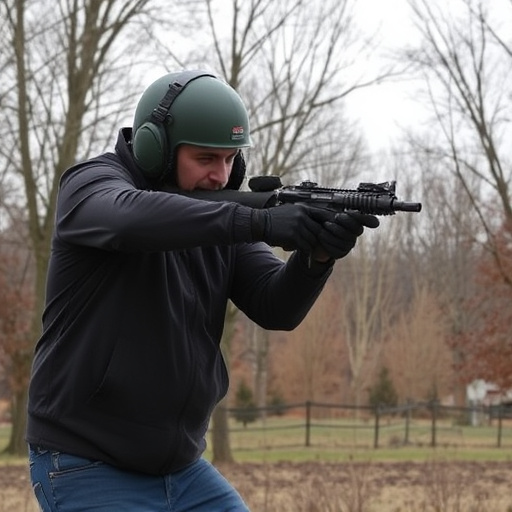Stun Guns: Debating Risk for Heart Patients & Safety Measures
Stun guns, despite claims of non-lethal self-defense, pose severe risks to individuals with pre-exis…….
Stun guns, despite claims of non-lethal self-defense, pose severe risks to individuals with pre-existing heart conditions. Their high-voltage pulses can trigger arrhythmias and cardiac arrest, especially in patients with weakened hearts or specific medications. Heart patients should exercise extreme caution, consult medical professionals, and consider alternative self-defense options due to the potential for life-threatening complications from stun gun use.
“Stun guns, often hailed as non-lethal weapons, utilize intense electrical charges to incapacitate targets. While their effectiveness is debated, the risks they pose, especially to heart patients, are concerning. This article delves into the intricacies of stun guns, focusing on their electrical charge mechanisms and potential dangers. We explore how these devices can impact vulnerable individuals with cardiac conditions, highlighting the critical need for awareness and regulatory measures to mitigate Stun Gun Risks for Heart Patients.”
- Understanding Stun Guns and Their Electrical Charge
- The Impact on Heart Patients: Risks and Complications
- Potential Side Effects Beyond Cardiac Issues
- Regulatory and Safety Measures for Stun Gun Use
Understanding Stun Guns and Their Electrical Charge

Stun guns, also known as electroshock weapons, operate by delivering a powerful electrical charge designed to temporarily incapacitate a target. This is achieved through a high-voltage, low-amperage pulse that disrupts muscle control, leading to loss of balance, disorientation, and in many cases, a complete collapse. However, it’s crucial to understand the implications for individuals with pre-existing heart conditions. Stun gun risks for heart patients are significant due to the potential for arrhythmias or irregular heartbeats triggered by the sudden jolt of electricity. The impact can be particularly severe for those suffering from cardiac arrhmias, heart disease, or who are taking certain medications that affect heart function.
The electrical charge used in stun guns is designed to be non-lethal, but its effects on vulnerable individuals cannot be overlooked. Studies have shown that stun guns can cause adverse cardiovascular reactions, especially when the target has a pre-existing cardiac condition. Therefore, individuals with known heart problems should exercise extreme caution or consider alternative self-defense options. It’s important for users to be aware of these risks and consult medical professionals if they have any concerns regarding their health before considering the use of stun guns as a means of personal protection.
The Impact on Heart Patients: Risks and Complications

For individuals with pre-existing heart conditions, the use of stun guns (or electric shock weapons) poses unique and significant risks. These devices emit a powerful electrical current designed to incapacitate a target, but for those with cardiovascular issues, it can lead to severe complications. Even a brief exposure to such high-voltage shocks can cause sudden cardiac arrest, especially in patients with already weakened or unregulating heart rhythms.
The impact on heart patients can be devastating, potentially leading to immediate and life-threatening outcomes. Risk factors include the device’s ability to disrupt normal heart function, causing irregular beats or even stopping the heart momentarily. Complications may arise from the electrical current disrupting the body’s natural rhythms, especially in those with pre-existing arrhythmias or congestive heart failure. Therefore, it is crucial for individuals with known cardiac problems to exercise extreme caution when considering carrying or using stun guns as a means of self-defense.
Potential Side Effects Beyond Cardiac Issues

While stun guns are designed to temporarily incapacitate individuals with an electrical shock, they pose significant risks to heart patients. Beyond cardiac issues like arrhythmias and potential heart failure, there are other severe side effects that can occur. The intense current can lead to muscle contractions, causing muscles around the heart to clench suddenly, further disrupting normal cardiac rhythm. This is especially dangerous for those with pre-existing cardiovascular conditions, as it may trigger a more severe episode or even a cardiac arrest.
Additionally, the impact of the shock on the nervous system can result in momentary loss of consciousness or disorientation. For heart patients, this could be perilous, as they might fall and sustain injuries, especially if they live alone and are unable to seek immediate medical attention after the stun gun activation. The risk of secondary complications, including respiratory distress and internal bleeding, is also elevated due to the body’s violent reaction to the electric discharge.
Regulatory and Safety Measures for Stun Gun Use

The use of stun guns, or electroshock weapons, is regulated by strict laws in many countries due to their potent and potentially dangerous nature. These devices emit a powerful electrical charge designed to incapacitate a target, making them a controversial tool for personal protection. However, it’s crucial to understand the risks, especially for individuals with pre-existing medical conditions such as heart patients. Stun guns can pose significant hazards, including temporary paralysis, muscle contractions, and in some severe cases, cardiac arrest or an irregular heartbeat, which can be particularly dangerous for those with cardiovascular issues.
Safety measures are essential when considering the use of stun guns. Users should undergo proper training to ensure safe handling and deployment. It’s recommended to consult medical professionals before carrying a stun gun if you have any heart-related conditions, as the device’s electrical current could interact with your body in unforeseen ways. Additionally, keeping up with regular check-ups can help identify potential risks and enable users to make informed decisions regarding self-defense options that align with their health status.
While stun guns offer a non-lethal self-defense option, it’s crucial to be aware of their potential risks, especially for individuals with heart conditions. The electrical charge they deliver can have serious side effects on cardiac patients, including arrhythmias and exacerbating existing heart issues. Beyond cardiac complications, stun guns may also cause temporary muscular pain, bruising, and even cognitive disruptions. Given these Stun Gun Risks for Heart Patients, responsible use and clear regulatory guidelines are essential to ensure public safety and mitigate potential harm.


